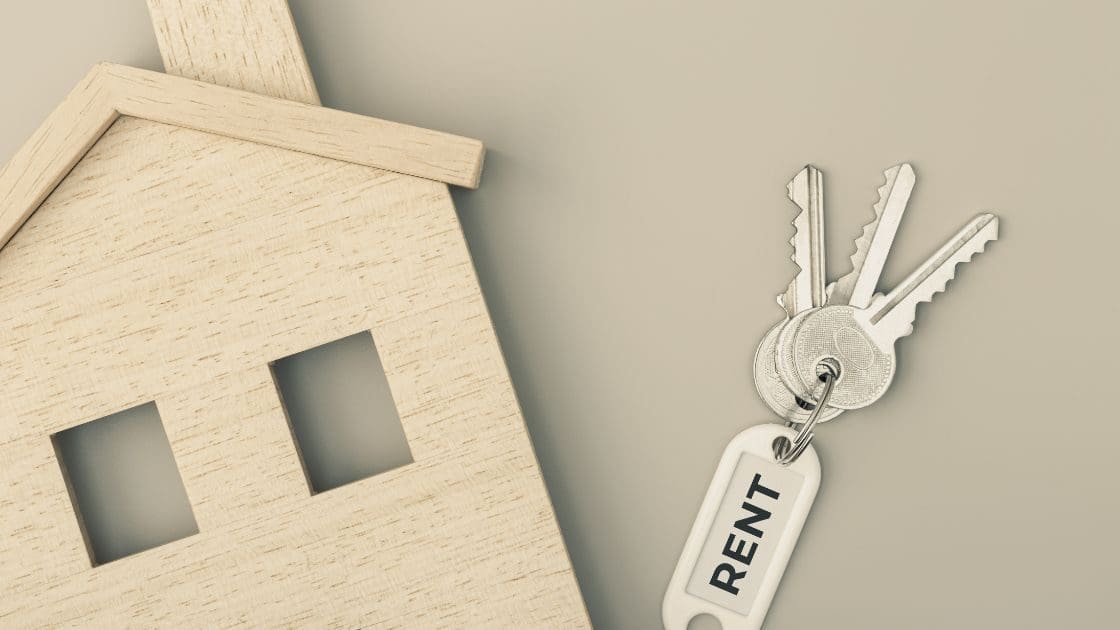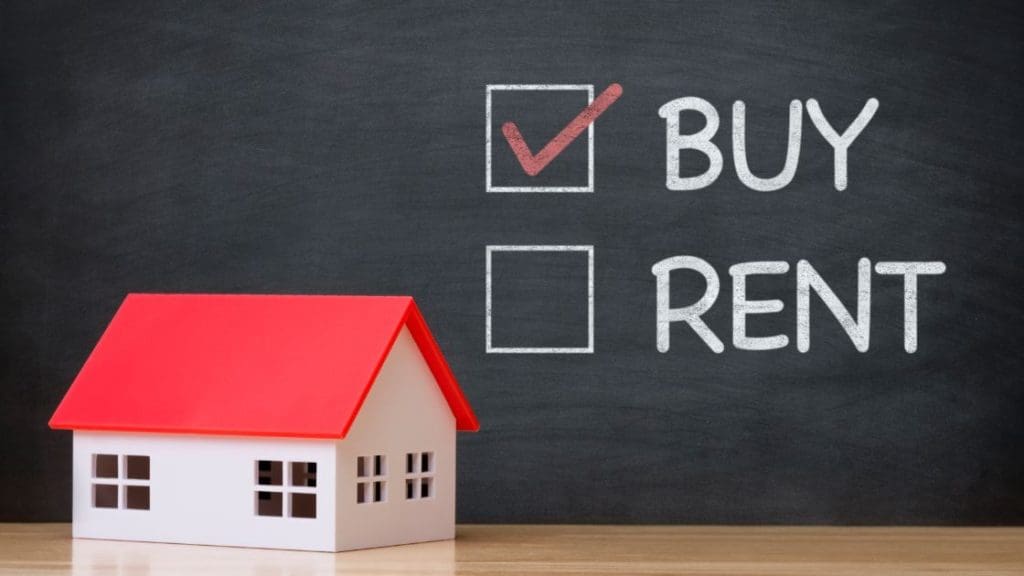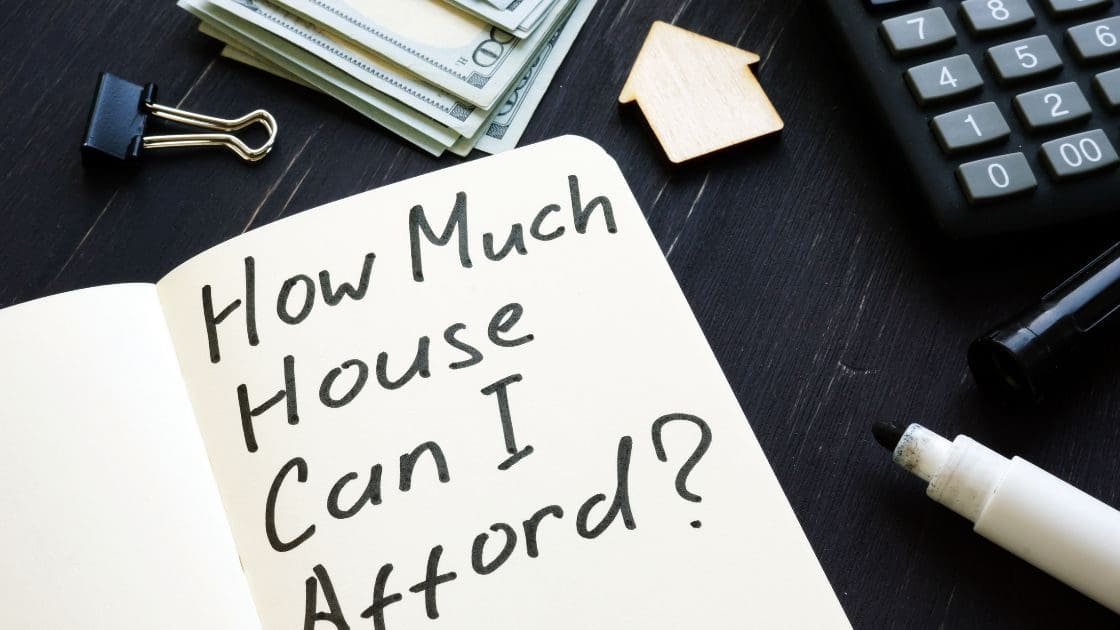Imagine you’re standing at a crossroads, with one path leading to a cozy rented apartment and the other to a charming home of your own. It’s a common dilemma: to rent or to buy? Whether you’re fresh out of college or planning for retirement, this question has likely crossed your mind. This blog post is your compass, guiding you through the maze of factors to consider before making this life-changing decision. From the financial implications of paying rent and market trends to lifestyle preferences and personal goals, we’ve got you covered. Are you ready to embark on this journey? Let’s go!
Short Summary
Deciding whether to rent or buy a home depends on your lifestyle, financial situation and the local real estate market.
Weighing the pros & cons of renting vs homeownership can help you decide which option is best for you.
Use rent vs buy calculators to get an overview of your finances and make an informed decision!
Rent or Buy a Home – What’s Right for You?

The decision to rent or buy a home is not one to be taken lightly. It’s like choosing between a hot cup of cocoa and a refreshing iced tea – both have their merits, but your choice depends on your tastes, circumstances, and the weather, right? Similarly, choosing between renting and buying depends on various factors, including your lifestyle, local market, financial situation, and even the whims of the federal reserve bank.
To add to the mix, we’ll delve deeper into the Ottawa, Ontario, rental and for-sale market, compare the rental security deposit and down payment, and weigh the monthly rent against mortgage payments. Ready? Let’s dive in!
The Rental and For Sale Market in Ottawa, Ontario
Picture this: you’re a knight in shining armour, ready to conquer the rental and for-sale market in Ottawa, Ontario. The real estate market is your dragon – competitive and fiery, with prices soaring high like the dragon’s flames. As a prospective tenant or homebuyer, the heat is on!
Deciding whether to rent or buy in this market is like a game of chess. You have to know the rules – like the five percent rule that determines the costs of homeownership – and make strategic moves based on the ever-changing dynamics of the market, such as mortgage payments, property taxes, and home insurance.
Also, don’t forget about the power-ups provided by the government for first-time homebuyers. Be prepared to face eviction rules that vary across provinces and remember, every move counts!
Rental Security Deposit vs Downpayment
Let’s now step into the boxing ring for a face-off: the rental security deposit versus the down payment. In the blue corner, we have the rental security deposit – a smaller but significant amount you pay as a guarantee to your landlord. It’s like a safety net, protecting your landlord from potential damages or unpaid rent.
In the red corner, we have the down payment – a heavyweight champion that requires a larger portion of the total home cost. It’s like a trust token, showing your lender that you’re serious about your mortgage loan.
While the rental security deposit might seem like the underdog, it’s a crucial factor to consider when deciding to rent or buy. Who will win the match in your case?
Comparing Rent and Mortgage Payments
Rent and mortgage payments. It’s like comparing apples and oranges, they’re fundamentally different but both are part of your financial diet. Monthly rent payments are typically lower than mortgage payments, but they only provide you with a place to live for a certain period. On the other hand, mortgage payments may be higher, but they’re a step towards owning a home and building home equity – a valuable asset for your financial future.
Consider the unrecoverable costs of both options, from the cost of rent to the cost of credit associated with a mortgage. Remember, a well-balanced financial diet is key to a healthy financial life. So, would you go for the apple or the orange?
The Financial Advantages of Renting

Renting a home is like renting a bike. It’s often more affordable, requires less maintenance, and gives you the freedom to change your ride as your needs change. It’s a great option if you value flexibility and mobility, or if you’re not ready for the long-term commitment of homeownership.
Let’s pedal into the specifics. We’ll start with the low upfront costs, roll into reduced maintenance expenses, and wrap up with the freedom of mobility and flexibility that renting offers. Ready to ride? Let’s go!
Lower Upfront Costs
Renting is like taking a bus ride – the fare is relatively low and you don’t have to worry about the cost of fuel or maintenance. Your initial costs are typically limited to a security deposit, first month’s rent, and possible application or pet fees. It’s a more affordable option if you’re not ready for the substantial financial commitment of down payment, property taxes, home insurance, and condo fees that come with buying a home.
But remember, just as the bus ride ends at the last stop, the money you invest in renting won’t contribute to building any home equity.
Reduced Maintenance Costs
In the rental world, you’re like a passenger in a cab – you enjoy the ride without worrying about the maintenance of the vehicle. The responsibility for repairs and upkeep rests on the landlord’s shoulders, not yours. This can save you time and money, leaving you free to focus on other aspects of your life.
But remember, as a renter, you may be limited in making changes or renovations to make the property feel like your own, and this could impact renovation costs.
Flexibility and Mobility
Renting is like a game of hopscotch – you can easily hop from one square to another as your needs change. It gives you the freedom to relocate for a new job, to study, or just to experience a new neighbourhood. You’re not tied down by a mortgage and can adapt to life changes with relative ease.
However, remember that your rent is subject to increases, and you may have to deal with the uncertainty of lease renewals.
The Financial Advantages of Owning a Home

Owning a home is like planting a tree. It requires a significant investment of time, effort, and money upfront. But with time, it grows and yields fruit, providing long-term benefits such as a sense of stability, predictable expenses, tax perks, and a sense of pride.
Let’s delve deeper into these benefits. We’ll start with understanding homeownership as a long-term investment, then discuss the predictability it offers, the tax perks, and finally the pride of ownership.
Long term investment
Owning a home is like a slow-cooked stew – it takes time and patience, but the end result is worth it. The money you put into your mortgage builds home equity, creating a long-term investment that can appreciate in value over time. It’s like having a savings account that grows with each mortgage payment you make.
Plus, any improvements you make to the property can potentially increase its market value.
Predictability
Owning a home is like having a steady job – it provides a sense of security and predictability. With a fixed-rate mortgage, your monthly payments remain the same throughout the term of the loan. You won’t have to worry about rent increases or changes in your housing expenses.
It’s a comforting thought, isn’t it?
Tax perks
Owning a home comes with some sweet tax perks – it’s like having a backstage pass at a concert. You may be eligible for tax deductions for your mortgage interest, property taxes, and even some home equity loan interest. Additionally, you might encounter land transfer tax during the home-buying process.
Plus, when it’s time to sell, you may be exempt from capital gains tax on the profit from the sale of your primary residence.
Pride of ownership
Owning a home is like owning a masterpiece – it instills a sense of pride, accomplishment, and satisfaction. You have the freedom to create a space that reflects your style and personality. Plus, there’s a sense of stability and security that comes from knowing you have a place to call your own.
It’s a priceless feeling, isn’t it?
Renting and Home Equity: Weighing the Pros and Cons

Renting and homeownership are like two sides of a coin – each has its pros and cons. On one side, renting offers lower upfront costs, reduced maintenance, and more flexibility. On the other side, homeownership is a long-term investment that offers stability, tax benefits, and the pride of ownership.
But what if we could delve deeper? Let’s do just that. We’ll weigh the pros and cons of building home equity, compare property value appreciation with rent stability, and consider personal goals and lifestyle. Ready to flip the coin?
Building Home Equity
Building home equity is like filling a piggy bank – each mortgage payment you make adds to your savings. Over time, this equity can grow, providing you with a valuable financial asset.
On the other hand, renting doesn’t offer this advantage. You pay rent each month, but you don’t build any equity in the property. Instead, your payments go towards maintaining your landlord’s equity.
Property Value Appreciation vs. Rent Stability
Property value appreciation is like a roller coaster ride – it can go up and down depending on various factors. As a homeowner, this could mean the home value may increase over time, potentially providing you with a higher return on your investment.
On the other hand, rent payments are usually more stable and predictable. So, would you prefer the thrill of the roller coaster ride or the stability of the merry-go-round?
Considering Personal Goals and Lifestyle
Your personal goals and lifestyle are like a compass guiding your decision to rent or buy. Do you value flexibility and mobility? Renting might be a better fit. Looking for stability and long-term investment? Homeownership could be the way to go. Ultimately, the decision to rent or buy should align with your financial stability, lifestyle, and long-term plans.
Navigating the Rental Property Market

Navigating the rental property market is like exploring a new city. It can be exciting, but also a bit overwhelming. Whether you’re searching for a rental property, trying to understand lease agreements, or dealing with condo fees and property taxes, we’re here to guide you.
Searching for a Rental Property
Searching for a rental property is like a treasure hunt – you never know what gems you might find. You can start by checking out rental listings online, asking for recommendations from friends and family, or speaking with a real estate agent. Don’t forget to consider factors like location, amenities, rental price, and lease length.
And remember, the journey is as exciting as the destination!
Understanding Lease Agreements
Understanding lease agreements is like decoding a secret message – it’s crucial to know what you’re signing up for. A lease agreement is a legally binding document that outlines the terms of your rental agreement, including rent amount, payment due dates, security deposit, and property rules.
So, make sure to read the fine print before you sign!
Dealing with Condo Fees and Property Taxes
Dealing with condo fees and property taxes is like fitting puzzle pieces together – it’s an important part of the renting picture. Condo fees are additional costs that cover maintenance and repairs for the building, while property taxes are usually covered by the landlord.
Navigating the For Sale Market

Navigating the for-sale market requires careful planning, the right tools, and a good sense of direction. Whether it’s getting pre-approved for a mortgage, searching for homes, utilizing the MLS system, engaging with a realtor, or negotiating property prices and commissions, we’re here to help you navigate these waters.
Getting Pre-Approved
Getting pre-approved for a mortgage is like getting a backstage pass – it gives you access to the show. Pre-approval means that a lender has reviewed your financial situation and determined the maximum amount they’re willing to lend you.
Searching for Homes For Sale
Searching for homes for sale is like browsing through a bookstore – there’s a perfect match for everyone. You can start by checking out online real estate websites, driving around neighbourhoods, or even enlisting the help of a real estate agent.
Remember, the perfect home is out there waiting for you – happy hunting!
Using the MLS System
Using the MLS system is like having a library card – it gives you access to a wealth of information. The MLS system is a database of real estate listings that can help you find properties that meet your needs. It’s like having your own personalized real estate library at your fingertips.
For Sale By Owner (FSBO)

Buying a home directly from the owner, also known as For Sale By Owner (FSBO), is like buying a car from a private seller – it can save you money on commissions. But remember, it requires more effort on your part to negotiate the price and handle the paperwork.
Engaging With A Realtor
Engaging with a realtor is like having a personal tour guide – they can help you navigate the market, find the perfect home, and negotiate the best deal. Plus, they can provide expert advice and guidance throughout the process.
Negotiating the Property Price and Commissions
Negotiating the property price and commissions requires strategy, patience, and a good poker face. It’s all about discussing the terms of the sale with the seller and coming to a conclusion on the final price and commission. Here’s a basic guide to help you navigate through this:
Research the Market: The first step in any negotiation is to have a thorough understanding of the market conditions. You need to analyze the local real estate market, understand the average price for the type of property you are interested in, the average time homes are staying on the market, and whether it’s a buyer’s or a seller’s market. This information will serve as a foundation for your negotiation.
Get a Home Inspection: A professional home inspection will provide a detailed report on the condition of the house. Any potential problems or needed repairs can be strong negotiation points for lowering the asking price.
Know Your Budget: You need to know your maximum limit and aim to stay within it. Remember, your first offer should not be your maximum amount, as you want to leave some room for negotiation.
Make a Fair Initial Offer: An offer that’s too low could offend the seller and start negotiations on the wrong foot, while an offer that’s too high leaves less room for negotiation. Your real estate agent can guide you on what’s a fair offer based on the current market conditions and the specific property.
Include Contingencies in Your Offer: Contingencies protect you in the event that something goes wrong. They might include financing, inspection, appraisal, and sale of your current home. The fewer contingencies, the stronger your offer looks to the seller.
Negotiate Home Repairs or Concessions: If the inspection reveals issues with the home, you can negotiate for the seller to pay for repairs or to provide a concession at closing to cover the cost of addressing these issues.
Be Ready to Walk Away: This might be hard, especially if you love the house, but remember there will be other homes. If the seller isn’t willing to negotiate to a price that works for you, it’s better to walk away than overpay.
As for realtor commissions, they are typically paid by the seller and built into the home‘s sale price. In general, commission rates are not set in stone and can sometimes be negotiated. However, this is more common in a seller’s market or with realtors who are motivated to close deals. As a buyer, you might not have much leverage in negotiating the commission. If the commission is a concern, you may want to look into buyer rebate programs or real estate brokerages that offer refunds on a portion of the commission.
Always remember to consult with your real estate agent or a real estate attorney throughout this process. They can provide you with professional advice that aligns with your specific situation.
Rent vs. Buy Calculators: Making an Informed Decision
Using a rent vs. buy calculator is like using a compass – it can guide you in making an informed decision. These calculators take into account multiple factors like rent, mortgage payments, down payment, interest rates, property taxes, and home insurance. They can provide a clearer picture of the financial implications of renting versus buying.
How Rent vs. Buy Calculators Work
Rent vs. buy calculator works like a financial GPS – it takes in all the financial factors and provides a clear map for your journey. These calculators take into account various factors such as financial considerations, housing market conditions, and personal preferences to provide insights into which option may be more advantageous in the long run. Here’s a breakdown of how to rent vs. buy calculators work:
Financial Inputs: Rent vs. buy calculators require inputting financial information, including the purchase price of a home, down payment amount, mortgage interest rate, annual property taxes, homeowner’s insurance, and closing costs. On the rental side, users input the monthly rent amount and any rental insurance costs.
Time Horizon: The calculator allows users to specify the duration they plan to stay in the property, usually in years. This timeframe is essential because the financial implications of renting versus buying can vary depending on the length of occupancy.
Home Appreciation: Rent vs. buy calculators consider the projected rate of home appreciation over the chosen time horizon. By incorporating historical data and market trends, the calculator estimates the potential increase in the value of the property over time.
Rent Increases: Since rent prices tend to rise over time, calculators account for estimated annual rent increases. This factor is crucial in evaluating the long-term cost of renting.
Maintenance and Other Costs: Owning a home involves additional expenses, such as maintenance, repairs, homeowner association fees (if applicable), and potential renovation costs. Rent vs. buy calculators typically include an estimate of these costs to provide a comprehensive comparison.
Tax Considerations: Homeownership can offer tax benefits, such as deducting mortgage interest and property taxes from taxable income. The calculator takes these tax advantages into account when evaluating the financial implications of buying a home.
Opportunity Cost: Rent vs. buy calculators factor in the opportunity cost of investing the down payment and potential savings from renting instead of owning. By assuming a rate of return on investments, the calculator determines the potential earnings that could be gained by investing the down payment rather than using it for a home purchase.
Calculation Results: Once all the necessary inputs are provided, the calculator generates results that illustrate the financial outcomes of renting versus buying. These results typically include a comparison of total costs over the specified time period, the breakeven point (where the cost of renting equals the cost of buying), and the potential wealth accumulation from homeownership.
Interpreting Calculator Results
Interpreting the results of a rent vs. buy calculator is like reading a weather forecast – it helps you plan your journey. But remember, just like the weather, financial situations can change. So, it’s important to take the results as a guide and consider them in the context of your personal goals and circumstances.
It’s important to note that rent vs. buy calculators provide estimates and general guidance, but they should not be the sole determining factor in your decision-making process. Other factors, such as personal preferences, housing market conditions, and lifestyle considerations, should also be taken into account.
Summary
Just like the final chapter of a riveting novel, we’ve reached the end of our journey. We’ve navigated the complex world of renting versus buying, explored the financial advantages of each option, and delved into the intricacies of the rental and for-sale market. We’ve also equipped you with handy tools like rent vs. buy calculators to make an informed decision. Remember, whether you choose to rent or buy, the most important thing is to choose a home that aligns with your lifestyle, financial situation, and personal goals. Now that you’re armed with this knowledge, you’re ready to make your move. Happy house hunting!



